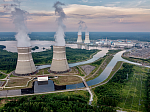03.07.2023
COMMUNIKATIONS DEPARTAMENT OF ROSENERGOATOM
Russian NPPs overfulfilled the task of the FAS Russia by 2.24% in the first half of 2023
Russian nuclear power plants (branches of Rosenergoatom, Electric Power Division of Rosatom State Corporation) generated over 106.46 billion kilowatt-hours in six months of 2023, or 102.24% of the balance target* of the Federal Antimonopoly Service (FAS) of Russia.
Therefore, since the beginning of this year, about 2.33 billion kWh have been generated in excess of the balance target.
Let us recall that the FAS Russia’s annual balance target for the generation of electricity and heat is formed for each power plant based on the forecasted generation of electricity and heat by all power plants in the country, taking into account their operating modes, repairs, external restrictions and other factors, as well as taking into account the forecast mode of electricity consumption and heat. The operation of all Russian NPPs for 6 months of 2023 made it possible to prevent emissions of greenhouse gases into the atmospheric air in the amount of more than 52 million tons of CO2 equivalent. In June generation amounted to almost 17.85 billion kilowatt-hours of electricity (as of 07/01/2023).
Today, the share of power generation by nuclear power plants in Russia's energy balance is about 20%, and by 2045 it should reach 25%. Such an instruction was given to Rosatom State Corporation by the President of Russia. The development of nuclear technologies, the construction of new NPP units in Russia means new jobs, improving the quality of life for people in the satellite towns of nuclear power plants.
At the moment, the construction of new power units of the Kursk NPP-2 under the PWR-TOI project is underway, as well as work on the construction of new power units No. 7, 8 of the Leningrad NPP and No. 1, 2 of the Smolensk NPP-2. In addition, a power unit with a fast reactor BREST-300 is being built in Seversk (Tomsk region) as part of the Proryv project to create a new technological platform, as well as two modernized low-power floating power units (LFPU) for Chukotka. The plans of nuclear scientists include the construction of other nuclear facilities, including a small ground station in the Republic of Sakha (Yakutia).
Today, Russia continues to provide stable energy security. Energy is the basis for the progressive social and economic development of the country, the supply of industry and citizens. The domestic fuel and energy complex works to increase the competitiveness of the national economy, contributes to the development and improvement of the country's regions, cities, towns, to improve the quality of life of citizens. The share of low-carbon power generation in the Russian energy sector is already about 40%. In the future, taking into account the growth in the share of nuclear generation, it will only grow.
Therefore, since the beginning of this year, about 2.33 billion kWh have been generated in excess of the balance target.
Let us recall that the FAS Russia’s annual balance target for the generation of electricity and heat is formed for each power plant based on the forecasted generation of electricity and heat by all power plants in the country, taking into account their operating modes, repairs, external restrictions and other factors, as well as taking into account the forecast mode of electricity consumption and heat. The operation of all Russian NPPs for 6 months of 2023 made it possible to prevent emissions of greenhouse gases into the atmospheric air in the amount of more than 52 million tons of CO2 equivalent. In June generation amounted to almost 17.85 billion kilowatt-hours of electricity (as of 07/01/2023).
Today, the share of power generation by nuclear power plants in Russia's energy balance is about 20%, and by 2045 it should reach 25%. Such an instruction was given to Rosatom State Corporation by the President of Russia. The development of nuclear technologies, the construction of new NPP units in Russia means new jobs, improving the quality of life for people in the satellite towns of nuclear power plants.
At the moment, the construction of new power units of the Kursk NPP-2 under the PWR-TOI project is underway, as well as work on the construction of new power units No. 7, 8 of the Leningrad NPP and No. 1, 2 of the Smolensk NPP-2. In addition, a power unit with a fast reactor BREST-300 is being built in Seversk (Tomsk region) as part of the Proryv project to create a new technological platform, as well as two modernized low-power floating power units (LFPU) for Chukotka. The plans of nuclear scientists include the construction of other nuclear facilities, including a small ground station in the Republic of Sakha (Yakutia).
Today, Russia continues to provide stable energy security. Energy is the basis for the progressive social and economic development of the country, the supply of industry and citizens. The domestic fuel and energy complex works to increase the competitiveness of the national economy, contributes to the development and improvement of the country's regions, cities, towns, to improve the quality of life of citizens. The share of low-carbon power generation in the Russian energy sector is already about 40%. In the future, taking into account the growth in the share of nuclear generation, it will only grow.


 career
career Innovations
Innovations Projects
Projects INTERNATIONAL BUSINESS
INTERNATIONAL BUSINESS